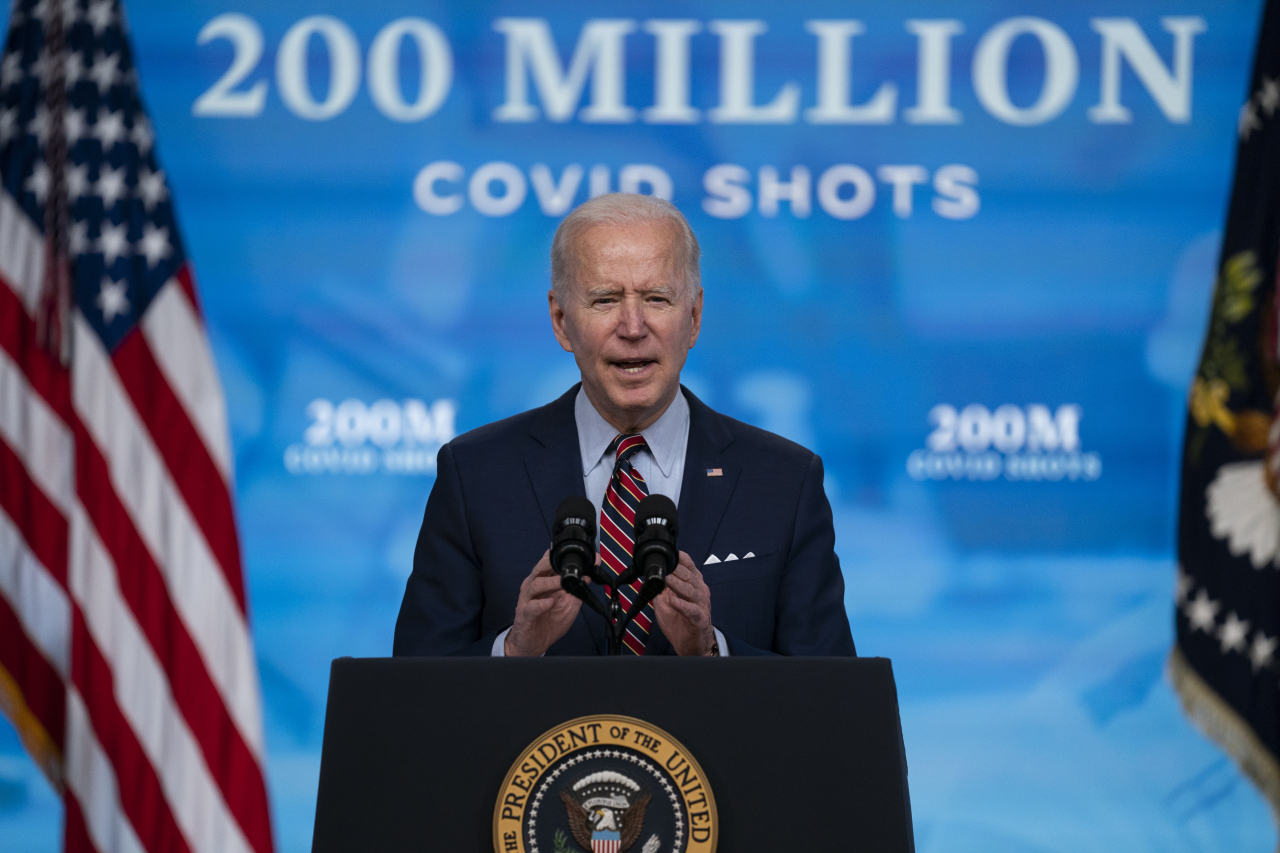South Korea’s hopes of procuring COVID-19 vaccines through a swap arrangement with the US are facing a roadblock, as Washington ruled out sending vaccines overseas until it secures adequate supplies at home.
US President Joe Biden made the remarks Wednesday, days after Korean Foreign Minister Chung Eui-yong revealed at a parliamentary session that Seoul was seriously discussing a “vaccine swap” arrangement with Washington as Korea scrambled to address its vaccine shortage.
“We’re looking at what is going to be done with some of the vaccines that we are not using. We’ve got to make sure they are safe to be sent,” Biden said at the White House, as he celebrated the country having administered 200 million COVID-19 vaccinations. “And we hope to be able to be of some help and value to countries around the world.”
On the decision to loan some 1.5 million doses of AstraZeneca vaccines to neighboring Canada, Biden said, “We helped a little bit there, we’re going to try and help some more.
“But there’s other countries as well that I’m confident we can help, including in Central America, and so it’s in process. We don’t have enough to be confident to send it abroad now. But I expect we’re going to be able to do that.”
The State Department echoed a similar stance when asked about the vaccine swap discussion with Korea.
Department spokesperson Ned Price said he would not get into the details of “private diplomatic communications” with Korea, but stressed that first and foremost Washington was focused on the vaccination efforts at home.
“As we are in a more comfortable and competent position here at home with our own vaccination effort, as we’ve been able to address contingencies that may arise, I expect we may be able to do more, but right now that’s our focus,” he said.
The idea of a swap deal was first floated in December by Rep. Park Jin of the main opposition People Power Party. In such a deal, Korea would receive surplus vaccines from the US and repay the country later with vaccines produced by Korean pharmaceutical companies.
At the time, the government did not pick up on the idea as the vaccine supply was tight globally. But with the US expected to have a vaccine surplus by the end of May and having indicated it might share its excess doses with other countries, Seoul began looking to its ally for assistance.
In calling on Washington for help in easing Korea’s vaccine shortages, Chung on Wednesday stressed the allies’ “special relationship,” referring to last year when Korea helped the US by providing face masks and COVID-19 test kits even though Korea’s domestic supplies were low.
The top diplomat also hinted at the possibility of expanding exchanges in other business areas in return for obtaining vaccines from the US, but rejected speculation that the deal might be linked to other diplomatic issues.
“There are many areas of exchange with Washington, not only the vaccines. We could help the US in the global supply chain, which President Biden is interested in,” he said at a forum with local journalists.
Chung had expressed hopes of a vaccine deal with Washington before next month, when President Moon Jae-in heads to Washington for a summit with Biden.
The Korean government is under fire for a shortfall of vaccines at home, with just 3.6 percent of the 52 million-strong population inoculated, a low rate in comparison with the 40 percent vaccination rate in the US. The government has pledged to reach herd immunity by November, but supply shortages and escalating safety concerns have presented obstacles.
With the Moon administration coming under criticism for the slow rollout of vaccines as well as over a renewed spike in coronavirus cases here, the government is looking at ways to secure vaccines through different channels and at the possibility of turning to other countries as well.
On Wednesday, Moon ordered his aides to review the introduction of Russia’s Sputnik V vaccine here. His office is now studying the Russian vaccine’s safety and the situation in other countries.
The Foreign Ministry on Thursday confirmed it had instructed its overseas diplomatic missions to gather safety information on the Russian vaccine, in response to a request from the Ministry of Food and Drug Safety.
Earlier, the Drug Ministry said it had asked the Foreign Ministry to help collect data on Sputnik V from 12 countries where the vaccine had been rolled out to study its safety, including side effects such as blood clotting events.
By Ahn Sung-mi (
sahn@heraldcorp.com)





![[Exclusive] Hyundai Mobis eyes closer ties with BYD](http://res.heraldm.com/phpwas/restmb_idxmake.php?idx=644&simg=/content/image/2024/11/25/20241125050044_0.jpg)
![[Herald Review] 'Gangnam B-Side' combines social realism with masterful suspense, performance](http://res.heraldm.com/phpwas/restmb_idxmake.php?idx=644&simg=/content/image/2024/11/25/20241125050072_0.jpg)

